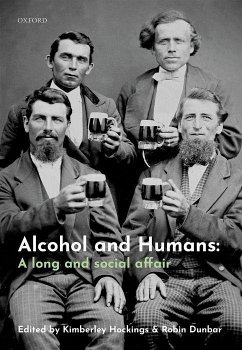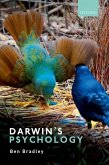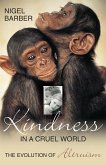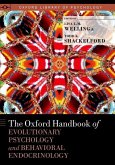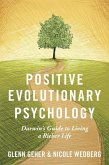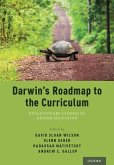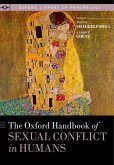Alcohol and Humans
A Long and Social Affair
Herausgeber: Hockings, Kimberley; Dunbar, Robin
Alcohol and Humans
A Long and Social Affair
Herausgeber: Hockings, Kimberley; Dunbar, Robin
- Gebundenes Buch
- Merkliste
- Auf die Merkliste
- Bewerten Bewerten
- Teilen
- Produkt teilen
- Produkterinnerung
- Produkterinnerung
Alcohol use has a long and ubiquitous history. This fascinating multi-disciplinary volume examines the broad use of alcohol in the human lineage and its wider relationship to social contexts such as feasting, sacred rituals, and social bonding.
Andere Kunden interessierten sich auch für
![Darwin's Psychology Darwin's Psychology]() Ben BradleyDarwin's Psychology63,99 €
Ben BradleyDarwin's Psychology63,99 €![Kindness in a Cruel World Kindness in a Cruel World]() Nigel BarberKindness in a Cruel World25,99 €
Nigel BarberKindness in a Cruel World25,99 €![Oxford Handbook of Evolutionary Psychology and Behavioral Endocrinology Oxford Handbook of Evolutionary Psychology and Behavioral Endocrinology]() Oxford Handbook of Evolutionary Psychology and Behavioral Endocrinology228,99 €
Oxford Handbook of Evolutionary Psychology and Behavioral Endocrinology228,99 €![Positive Evolutionary Psychology Positive Evolutionary Psychology]() Glenn GeherPositive Evolutionary Psychology125,99 €
Glenn GeherPositive Evolutionary Psychology125,99 €![Evolutionary Psychology Evolutionary Psychology]() Christopher BadcockEvolutionary Psychology37,99 €
Christopher BadcockEvolutionary Psychology37,99 €![Darwin's Roadmap to the Curriculum Darwin's Roadmap to the Curriculum]() Darwin's Roadmap to the Curriculum233,99 €
Darwin's Roadmap to the Curriculum233,99 €![Oxford Handbook of Sexual Conflict in Humans Oxford Handbook of Sexual Conflict in Humans]() Oxford Handbook of Sexual Conflict in Humans227,99 €
Oxford Handbook of Sexual Conflict in Humans227,99 €-
-
-
Alcohol use has a long and ubiquitous history. This fascinating multi-disciplinary volume examines the broad use of alcohol in the human lineage and its wider relationship to social contexts such as feasting, sacred rituals, and social bonding.
Hinweis: Dieser Artikel kann nur an eine deutsche Lieferadresse ausgeliefert werden.
Hinweis: Dieser Artikel kann nur an eine deutsche Lieferadresse ausgeliefert werden.
Produktdetails
- Produktdetails
- Verlag: Oxford University Press (UK)
- Seitenzahl: 226
- Erscheinungstermin: 5. Februar 2020
- Englisch
- Abmessung: 250mm x 174mm x 18mm
- Gewicht: 562g
- ISBN-13: 9780198842460
- ISBN-10: 0198842465
- Artikelnr.: 57355679
- Herstellerkennzeichnung
- Produktsicherheitsverantwortliche/r
- Europaallee 1
- 36244 Bad Hersfeld
- gpsr@libri.de
- Verlag: Oxford University Press (UK)
- Seitenzahl: 226
- Erscheinungstermin: 5. Februar 2020
- Englisch
- Abmessung: 250mm x 174mm x 18mm
- Gewicht: 562g
- ISBN-13: 9780198842460
- ISBN-10: 0198842465
- Artikelnr.: 57355679
- Herstellerkennzeichnung
- Produktsicherheitsverantwortliche/r
- Europaallee 1
- 36244 Bad Hersfeld
- gpsr@libri.de
Kimberley Hockings is a lecturer in Conservation Science at the Centre of Ecology and Conservation at the University of Exeter. Her research examines the ways in which human and nonhuman great apes coexist in shared landscapes, including in their overlapping use of resources such as fermented beverages. From this she has developed an interest in the evolutionary origins of ethanol consumption in humans. To effectively understand human and wildlife components of interactions her research increasingly combines biological, ecological, and social science approaches. She conducts fieldwork in Guinea and Guinea-Bissau, west Africa, and is a member of the Great Ape Section of the IUCN/SSC Primate Specialist Group. Robin Dunbar is Professor of Evolutionary Psychology at the University of Oxford, and Emeritus Fellow of Magdalen College. He was elected a Fellow of the British Academy in 1998. His principal research interests focus on the evolution of sociality (with particular reference to primates and humans). He is best known for the social brain hypothesis, the gossip theory of language evolution and Dunbar's Number (the limit on the number of relationships that we can manage). He has published 30 books and edited volumes and over 300 journal articles.
* 1: Robin Dunbar and Kimberley Hockings: The puzzle of alcohol
consumption
* 2: Robert Dudley: The natural biology of dietary ethanol, and its
implications for primate evolution
* 3: Matthew Carrigan: Hominoid Ancestry and the Adaptation to Dietary
Ethanol
* 4: Kimberley Hockings, Miho Ito and Gen Yamakoshi: The Importance of
Raffia Palm Wine to Coexisting Humans and Chimpanzees
* 5: Elisa Guerra-Doce: The earliest toasts: archaeological evidence of
the social and cultural construction of alcohol in prehistoric Europe
* 6: Patrick McGovern: Uncorking the past: alcoholic fermentation as
humankind's first biotechnology
* 7: Oliver Dietrich and Laura Dietrich: Rituals and feasting as
incentives for cooperative action at early Neolithic Göbekli Tepe
* 8: Michael Dietler: Alcohol as embodied material culture:
anthropological reflections on the deep entanglement of humans and
alcohol
* 9: Lewis Daly: The nature of sweetness: an indigenous fermentation
complex in Amazonian Guyana
* 10: Asher Rosinger and Hilary Bethancourt: Chicha as Water:
Traditional Fermented Beer Consumption Among Forager
Horticulturalists in the Bolivian Amazon
* 11: Robin Dunbar: Feasting and its Role in Human Community Formation
* 12: Angela McShane: Through the drinking glass: a long history of
pints and performative materialities in England
* 13: Kimberley Hockings and Robin Dunbar: Alcohol and humans:
reflections and prospects
consumption
* 2: Robert Dudley: The natural biology of dietary ethanol, and its
implications for primate evolution
* 3: Matthew Carrigan: Hominoid Ancestry and the Adaptation to Dietary
Ethanol
* 4: Kimberley Hockings, Miho Ito and Gen Yamakoshi: The Importance of
Raffia Palm Wine to Coexisting Humans and Chimpanzees
* 5: Elisa Guerra-Doce: The earliest toasts: archaeological evidence of
the social and cultural construction of alcohol in prehistoric Europe
* 6: Patrick McGovern: Uncorking the past: alcoholic fermentation as
humankind's first biotechnology
* 7: Oliver Dietrich and Laura Dietrich: Rituals and feasting as
incentives for cooperative action at early Neolithic Göbekli Tepe
* 8: Michael Dietler: Alcohol as embodied material culture:
anthropological reflections on the deep entanglement of humans and
alcohol
* 9: Lewis Daly: The nature of sweetness: an indigenous fermentation
complex in Amazonian Guyana
* 10: Asher Rosinger and Hilary Bethancourt: Chicha as Water:
Traditional Fermented Beer Consumption Among Forager
Horticulturalists in the Bolivian Amazon
* 11: Robin Dunbar: Feasting and its Role in Human Community Formation
* 12: Angela McShane: Through the drinking glass: a long history of
pints and performative materialities in England
* 13: Kimberley Hockings and Robin Dunbar: Alcohol and humans:
reflections and prospects
* 1: Robin Dunbar and Kimberley Hockings: The puzzle of alcohol
consumption
* 2: Robert Dudley: The natural biology of dietary ethanol, and its
implications for primate evolution
* 3: Matthew Carrigan: Hominoid Ancestry and the Adaptation to Dietary
Ethanol
* 4: Kimberley Hockings, Miho Ito and Gen Yamakoshi: The Importance of
Raffia Palm Wine to Coexisting Humans and Chimpanzees
* 5: Elisa Guerra-Doce: The earliest toasts: archaeological evidence of
the social and cultural construction of alcohol in prehistoric Europe
* 6: Patrick McGovern: Uncorking the past: alcoholic fermentation as
humankind's first biotechnology
* 7: Oliver Dietrich and Laura Dietrich: Rituals and feasting as
incentives for cooperative action at early Neolithic Göbekli Tepe
* 8: Michael Dietler: Alcohol as embodied material culture:
anthropological reflections on the deep entanglement of humans and
alcohol
* 9: Lewis Daly: The nature of sweetness: an indigenous fermentation
complex in Amazonian Guyana
* 10: Asher Rosinger and Hilary Bethancourt: Chicha as Water:
Traditional Fermented Beer Consumption Among Forager
Horticulturalists in the Bolivian Amazon
* 11: Robin Dunbar: Feasting and its Role in Human Community Formation
* 12: Angela McShane: Through the drinking glass: a long history of
pints and performative materialities in England
* 13: Kimberley Hockings and Robin Dunbar: Alcohol and humans:
reflections and prospects
consumption
* 2: Robert Dudley: The natural biology of dietary ethanol, and its
implications for primate evolution
* 3: Matthew Carrigan: Hominoid Ancestry and the Adaptation to Dietary
Ethanol
* 4: Kimberley Hockings, Miho Ito and Gen Yamakoshi: The Importance of
Raffia Palm Wine to Coexisting Humans and Chimpanzees
* 5: Elisa Guerra-Doce: The earliest toasts: archaeological evidence of
the social and cultural construction of alcohol in prehistoric Europe
* 6: Patrick McGovern: Uncorking the past: alcoholic fermentation as
humankind's first biotechnology
* 7: Oliver Dietrich and Laura Dietrich: Rituals and feasting as
incentives for cooperative action at early Neolithic Göbekli Tepe
* 8: Michael Dietler: Alcohol as embodied material culture:
anthropological reflections on the deep entanglement of humans and
alcohol
* 9: Lewis Daly: The nature of sweetness: an indigenous fermentation
complex in Amazonian Guyana
* 10: Asher Rosinger and Hilary Bethancourt: Chicha as Water:
Traditional Fermented Beer Consumption Among Forager
Horticulturalists in the Bolivian Amazon
* 11: Robin Dunbar: Feasting and its Role in Human Community Formation
* 12: Angela McShane: Through the drinking glass: a long history of
pints and performative materialities in England
* 13: Kimberley Hockings and Robin Dunbar: Alcohol and humans:
reflections and prospects

